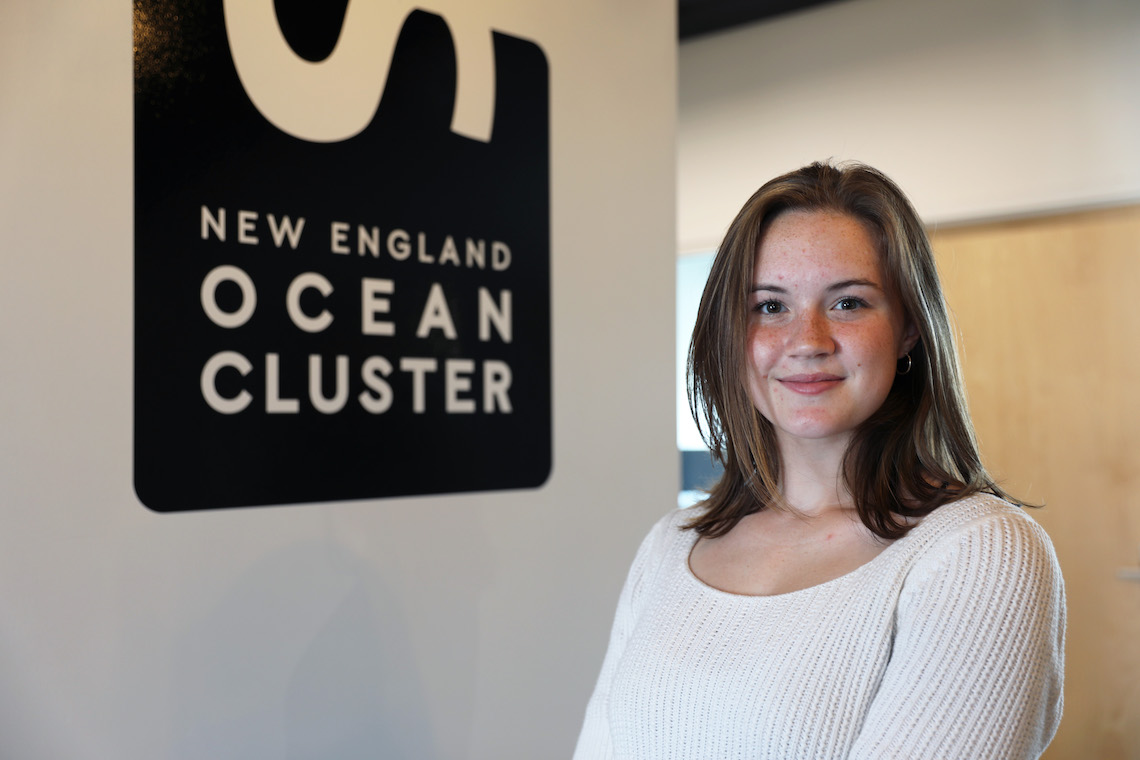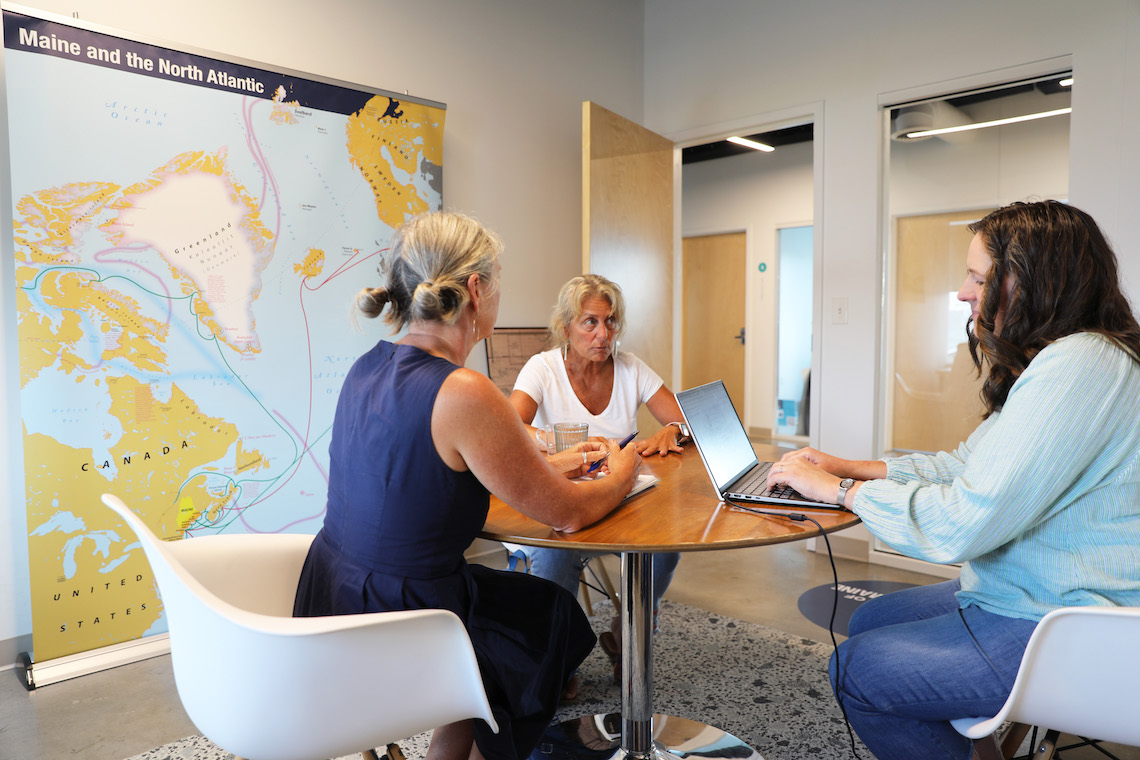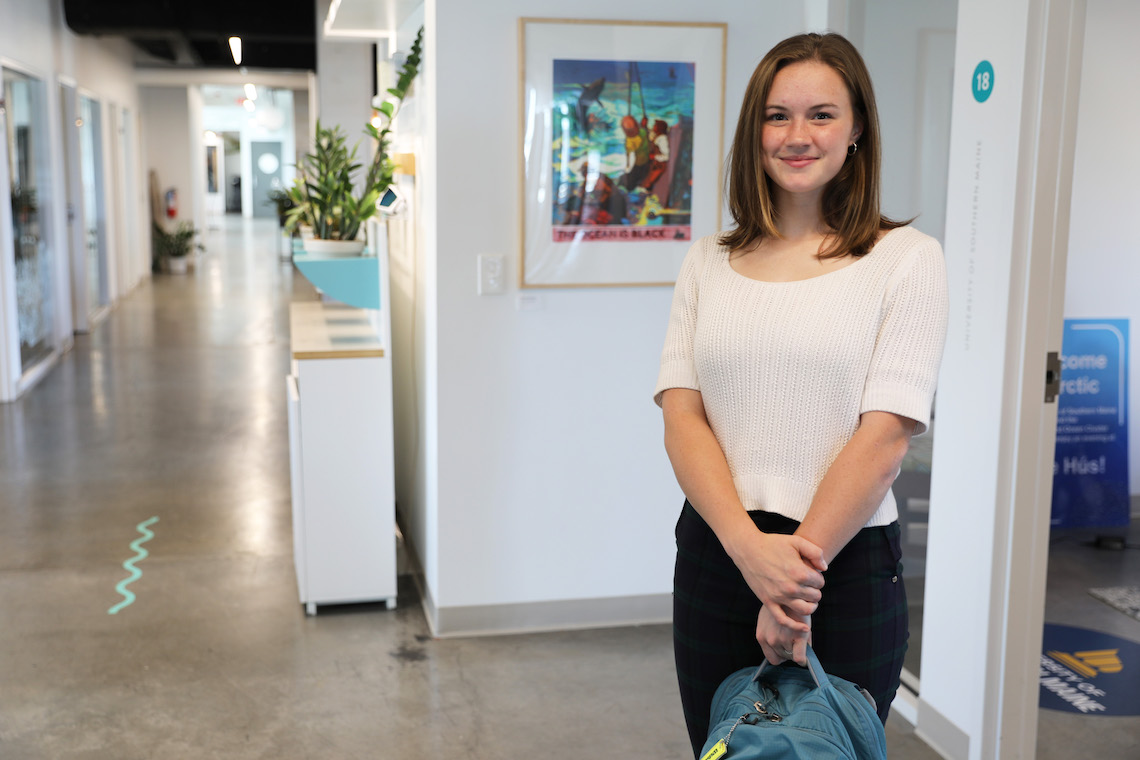An updated agreement ensures a partnership that connects the classroom to the boardroom will continue for years to come.
The University of Southern Maine and the New England Ocean Cluster (NEOC) signed a contract on August 1 extending their relationship into 2025. The original contract dates back to September 2015.
“The work that’s being done at places like NEOC is the future that can grow opportunities so that people don’t have to leave the state,” said Ross Hickey. “These are the jobs that will keep them here that are deeply connected to our heritage and to the ocean but in a real way that’s sustainable that’s gonna let them have a future.”
In addition to his teaching and administrative work at USM, Hickey also coordinates the University’s relationship with NEOC. He even helped to bring the relationship about through his friendship with Patrick Arnold, who co-founded NEOC with his wife Janeen Arnold.
The Arnolds achieved earlier business success in the field of marine transportation and shipping. That work sent them to Iceland, where they learned many of the local businesses had received help from the Iceland Ocean Cluster (IOC). Wanting to bring the same economic benefits to Maine, the Arnolds founded NEOC in October 2014.
Membership in NEOC is open to entrepreneurs who want to launch a new product, service, or an entire business within the framework of the Blue Economy — a business model based on the sustainable use of ocean resources for economic growth. NEOC advances those values by supplying like-minded partners with the tools, facilities, and expertise they need to succeed.
“We believe that true change takes patience and a thousand seeds planted — new companies, new products,” said Patrick Arnold. “Our work with USM continues to ensure that, no matter the company or product, we have the team necessary to field and support these various ventures.”

The University’s involvement with NEOC and its partners is multidimensional. Students can apply their skills as interns, consultants, and researchers. USM faculty also contribute their depth of knowledge in high-demand fields like engineering, chemistry, and finance.
Student interns are a regular presence at The Hús, a shared working environment on the Portland waterfront that serves as NEOC’s headquarters. The Hús (which means “house” in Icelandic) opened in June 2020. Students are central to the free flow of ideas that occurs there between NEOC members.
Mackenzie Renner is interning with NEOC for the semester. She is a USM sophomore working on a double major in Finance and Piano Performance. Her career goal is to become a financial advisor. Renner wants to explore how marine science can be an economic driver.
“From the preliminary research that I’ve done so far, I think it’s really interesting just how effective it can be to access the Blue Economy and use our ocean resources rather than wasting things,” Renner said.
Beyond traditional internships, NEOC members also recruit students to tackle specific needs. A short-term project might last only a few weeks to complete the necessary research. For bigger projects, the work might pass from one team of students to the next over multiple semesters.
USM/NEOC Partnership Timeline Highlights
Students from USM’s School of Business are some of the most active participants. Their studies make them especially well-suited for consulting work in areas such as marketing strategy, product development, operational tactics, performance evaluation, and more.
Richard Bilodeau teaches a USM business practicum that requires students to put their lessons to use in a real-world setting. And it’s not always the setting they anticipated. Working for NEOC members, students learn that the edge of a dock in Portland can be just as vital a place for business dealings as the corner office of a big city high-rise.
“It really crystallizes that you can do things that are better for the planet and also make money,” Bilodeau said. “It sort of satisfies those two different types of personas. So, you often get people working together who have a different mindset or a different way to view the world. And I think that is so critically important.”
In feedback from his students, Bilodeau noticed their favorite assignments were often the ones that did the most to protect the environment. A business that harvested plastic from the ocean to make recyclable grocery bags had students lining up to help. Student input also benefitted another project aimed at finding new uses for inedible parts of lobsters.

To get the best ideas, the input needs to be wide ranging. Business students collaborate with classmates across multiple disciplines through NEOC. Fields with a strong sustainability component, such as food services and environmental sciences, send a large number of students into the program.
Engineering skills can be as important as business savvy. Success for some of NEOC’s members hinges on a new approach to manufacturing. USM’s capabilities in that regard made a big stride in 2019 when the Composite Engineering Research Laboratory (CERL) arrived on campus. Dr. Asheesh Lanba leads his CERL team in the development and testing of new materials.
NEOC connected CERL with James Merrill, who had an idea to make high-end sunglasses and ski goggles out of recycled plastic bottles. CERL’s engineers worked with him to turn the idea into reality. The process they pioneered became a cornerstone of Merrill’s business, Opolis.
Not only does NEOC build bridges between the business and academic worlds, but it also builds bridges between cultures. Its ties to Iceland proved helpful when USM was looking for an overseas academic partner with a shared interest in studying the North Atlantic region. With NEOC playing the part of matchmaker, USM found its partner in Reykjavík University (RU).
USM and RU tested the waters of their new relationship with a reciprocal study abroad program in 2016. Its success led to a more comprehensive partnership agreement in 2017, which continues to this day. Students and faculty regularly travel between the two universities to learn from each other. And that exchange of ideas isn’t limited to campus.

Before any trip to Iceland, the USM delegation works with NEOC to finalize its travel plans. A quick call from Patrick Arnold can open doors to visit IOC and its member businesses. By seeing them at work, students gain a first-hand understanding of the market forces that drive international trade. USM will send its next contingent to Iceland in mid-October.
“To me, it’s part of that secret sauce of what makes an education valuable,” Bilodeau said. “You take classes that lay a foundation and then you get to go out in the world and practice before you actually graduate. So, these internships and practicums and travel courses, these all create that intersectionality between university life and real world.”
With each step into the wider world, USM expands its outlook. The University spent years developing the Maine North Atlantic Institute, finally launching it in 2018 as an international forum for academic cooperation. Attendance at the annual Arctic Circle Assembly also gives USM a voice in academic affairs across the region.
Bilodeau sees the potential for more growth. He’s working with the Honors Program to create a travel course to Denmark’s capital city of Copenhagen. He’d also like to see the School of Business offer a concentration in the ocean economy through its MBA program.
Bilodeau and Hickey agree that NEOC deserves credit for starting USM down a path that shows no signs of stopping.
“We haven’t hit the ceiling yet by any stretch,” Hickey said. “As they’ve grown, the opportunities have increased.”

